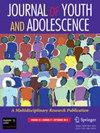Longitudinal Investigation into the Role of Perceived Social Support in Multicultural Adolescents' Life Satisfaction: Distinguishing Between-Person and Within-Person Associations.
IF 3.6
1区 心理学
Q1 PSYCHOLOGY, DEVELOPMENTAL
引用次数: 0
Abstract
Social support plays a critical role in promoting adolescents' psychological well-being. However, much of the existing research has relied on cross-sectional data and between-person analyses, limiting our understanding of how social support functions within individuals over time. This limitation is particularly consequential for South Korean multicultural adolescents-a growing and vulnerable population that includes children of international marriages, immigrants, and foreign nationals. Given their increasing numbers and elevated risk for psychosocial challenges, identifying the factors that support their well-being is both a research imperative and a social justice concern. The present study used the random intercept cross-lagged panel models to examine the within-person effects of perceived social support from family, teachers, and peers on South Korean multicultural adolescents' life satisfaction. This study employed three waves of longitudinal data from a nationally representative sample of South Korean multicultural adolescents (N = 1,635; 48.7% girls; Mage = 9.97 years, SD = 0.37; followed from Grade 4 to Grade 6). Random intercept cross-lagged panel models were employed to disentangle between-person and within-person associations. At the between-person level, higher perceived support from all sources was associated with greater life satisfaction. At the within-person level, only perceived family support positively predicted subsequent life satisfaction, while teacher and peer support did not show significant effects. These findings were consistent across all time points. Overall, the results highlight the unique and dynamic role of family support in shaping multicultural adolescents' life satisfaction and underscore the importance of distinguishing between different sources and levels of social support in developmental research.感知社会支持在多元文化青少年生活满意度中的作用的纵向调查:区分人际关系和人际关系。
社会支持在促进青少年心理健康方面起着至关重要的作用。然而,现有的许多研究都依赖于横断面数据和人与人之间的分析,限制了我们对社会支持如何随着时间的推移在个体中发挥作用的理解。这种限制对韩国的多元文化青少年尤其重要,这是一个不断增长的弱势群体,包括国际婚姻、移民和外国人的子女。鉴于他们的人数不断增加,心理社会挑战的风险也在增加,确定支持他们幸福的因素既是一项必要的研究,也是一个社会正义问题。本研究采用随机截距交叉滞后面板模型,考察来自家庭、教师和同伴的感知社会支持对韩国多元文化青少年生活满意度的影响。本研究采用了来自韩国多元文化青少年全国代表性样本的三波纵向数据(N = 1,635;48.7%的女孩;年龄= 9.97岁,SD = 0.37;从四年级到六年级)。随机截距交叉滞后面板模型被用来解开人与人之间和人与人之间的联系。在人与人之间的水平上,来自所有来源的更高的感知支持与更高的生活满意度相关。在个人层面上,只有感知到的家庭支持对后续生活满意度有正向影响,而教师和同伴支持对后续生活满意度没有显著影响。这些发现在所有时间点上都是一致的。总体而言,研究结果强调了家庭支持在塑造多元文化青少年生活满意度方面的独特和动态作用,并强调了在发展研究中区分不同来源和水平的社会支持的重要性。
本文章由计算机程序翻译,如有差异,请以英文原文为准。
求助全文
约1分钟内获得全文
求助全文
来源期刊

Journal of Youth and Adolescence
PSYCHOLOGY, DEVELOPMENTAL-
CiteScore
8.20
自引率
6.10%
发文量
155
期刊介绍:
Journal of Youth and Adolescence provides a single, high-level medium of communication for psychologists, psychiatrists, biologists, criminologists, educators, and researchers in many other allied disciplines who address the subject of youth and adolescence. The journal publishes quantitative analyses, theoretical papers, and comprehensive review articles. The journal especially welcomes empirically rigorous papers that take policy implications seriously. Research need not have been designed to address policy needs, but manuscripts must address implications for the manner society formally (e.g., through laws, policies or regulations) or informally (e.g., through parents, peers, and social institutions) responds to the period of youth and adolescence.
 求助内容:
求助内容: 应助结果提醒方式:
应助结果提醒方式:


